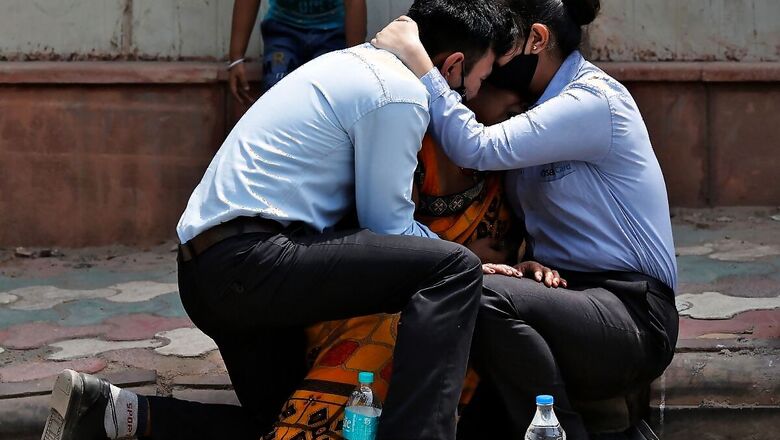
views
Every week, for several years, I’ve been taping a little audio postcard from Kolkata for a public radio station in San Francisco. It’s a slice of life from India featuring books, festivals, politics. Over the last year, it’s often been about living with the pandemic. But as the second wave wrought havoc in India, and my social media timeline filled up with images of crematoriums working overtime and desperate pleas for oxygen cylinders and emergency beds, nothing I could say felt like enough. One week instead of trying to analyse or opine I just had friends read out what I was seeing on my Twitter timeline.
“Dear friends, yesterday I lost my father due to COVID. Right now my mom’s oxygen level is 80-85. Please help me in getting an oxygen cylinder in South West Delhi. I don’t want to lose my mom now.”
“Time running out for Sandeep 39, COVID+, in need of dialysis with kidney issues. O2 dropped to 35, being driven around for hours. They are close to NephroPlus Dialysis Center at GREATER NOIDA. Where can they go? Pls DM with confirmed leads only.”
“The patient’s family has found help. Thank you to each one of you who shared leads. You’re all my heroes.”
A friend commented, “Too sad.” She was right. Beneath all the fear, the outrage, the anger, in the end there is just sadness. It’s all simply too sad.
Sarah Bezanson, a Canadian woman, recently posted on LinkedIn about making small talk while calling tech support in India. She asked the executive where he was. He said “New Delhi” and then broke down in tears. “I’m so sorry. It’s really bad here. I’ve lost someone every day for 10 days,” he said. She said they just stayed on the call for almost an hour, just being humans.
That anecdote is a glimpse into the situation in the nation’s capital. It is a reminder to be kinder to each other. But it also tells us how much grief is bottled up in us. We have no time to process it because there’s another condolence message to write, another fire to fight. Every time the WhatsApp pings, it’s like that dreaded phone call in the middle of the night.
Almost 10 days after a friend told me her mother had tested positive for COVID, I remembered I had not checked in on her. That news had gotten swamped in a deluge of other bad news. A mother and son grappling with the fact that a father and daughter were gone, half the family wiped out just like that. Someone up at an ungodly hour in America attending a Zoom funeral for a young niece in India. Someone losing both parents in a matter of days. Each story individually is heart-rending. Collectively, it feels like a cloudburst of grief.
No Six Degrees of Separation
India first went into lockdown when there were barely 500 cases in the country. While the images of migrants trying to walk across the breadth of India shook us, the pandemic was largely something most of us, cocooned in our WFH privilege, saw on television while we worried about when Amazon deliveries would resume. This time, there is no six degrees of separation anymore. Every encounter with the outside world feels like a game of Russian Roulette. Several friends on my school WhatsApp group have just recovered from COVID. Two others are on life support. The pro forma “How are you?” in emails to friends and acquaintances feels loaded.
This is grief unlike anything most of us have experienced before. Usually when a family member dies, the rest of the extended family comes together. In this case, the rest of the family might be in quarantine, or lockdown, even unaware of what has happened. There is grief, often anticipatory, for loss within the family. And it’s coupled with a larger sadness for a world that is changing beyond our control.
“We’re not used to this kind of collective grief in the air,” says David Kessler, co-author of On Grief and Grieving, in the Harvard Business Review. He says this grief too has stages though they may not be linear.
There’s denial (the virus won’t affect me), anger (You’re making me stay at home or wear a mask), bargaining (if we lockdown for one month, the virus will be defeated), and sadness (I don’t know when this will end).
Finally, he says, there is acceptance—“This is happening. I have to figure out how to proceed.”
A Shared Sorrow
And to proceed, we have to allow ourselves to be vulnerable like that person on tech support. Well-meaning friends, often from abroad, will exhort us to be positive and stay strong but sometimes the only way to pick up the pieces is to fall apart first. Some say the second wave has shaken us so deeply because it has hit “people like us” hard. Vidya Krishnan writes in The Atlantic that the blame cannot just be laid at the government’s feet. This is “the greatest moral failure of our generation” where wealthy and upwardly mobile Indians thought their money could buy them the best care possible while public health languished. Krishnan writes, “Today, they are clutching their pearls as their loved ones fail to get ambulances, doctors, medicine and oxygen.”
She is right. But that does not mean the grief these people feel should be dismissed as hypocritical either. If anything, we can hope this grief leaves us all a little humbler because this sorrow is shared. We are both witness to it and participant in it.
On Facebook, a friend posted the experience of a doctor who says towards the end of her shift they video-called the relatives of a sinking patient. The patient’s son just asked for a few minutes of her time. And then he sang “Tera mujhse hai pehle ka nata koi” to his dying mother. The doctor, Dipshikha Ghosh, writes “I just stood there, holding the phone, looking at him looking at his mother and singing. The nurses came over and stood in silence. He broke down in the middle but finished the verse. He asked her vitals, thanked me and hung up. Me and the nurses stood there.”
In The Year of Magical Thinking, the memoir she wrote after the death of her husband, Joan Didion said, “These people who have lost someone look naked because they think themselves invisible.”
I sometimes imagine, at the end of this, a country of naked people.
Read all the Latest News, Breaking News and Coronavirus News here. Follow us on Facebook, Twitter and Telegram.
















Comments
0 comment